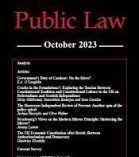Cracks in the Foundations?

Exploring the Tension Between Constitutional Tradition and Constitutional Culture in the UK on Referendums and Scottish Independence.
By Nicky Gillibrand, Somsubhra Banerjee and Eoin Carolan
To read the full article please click here: